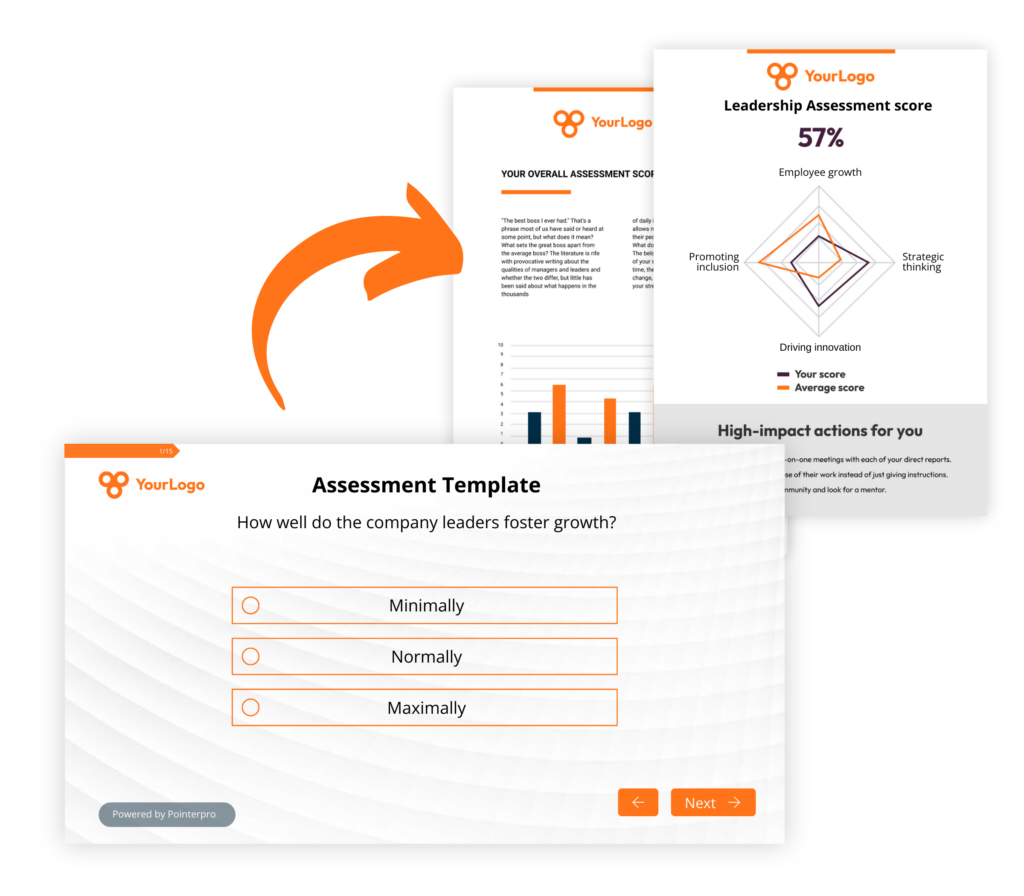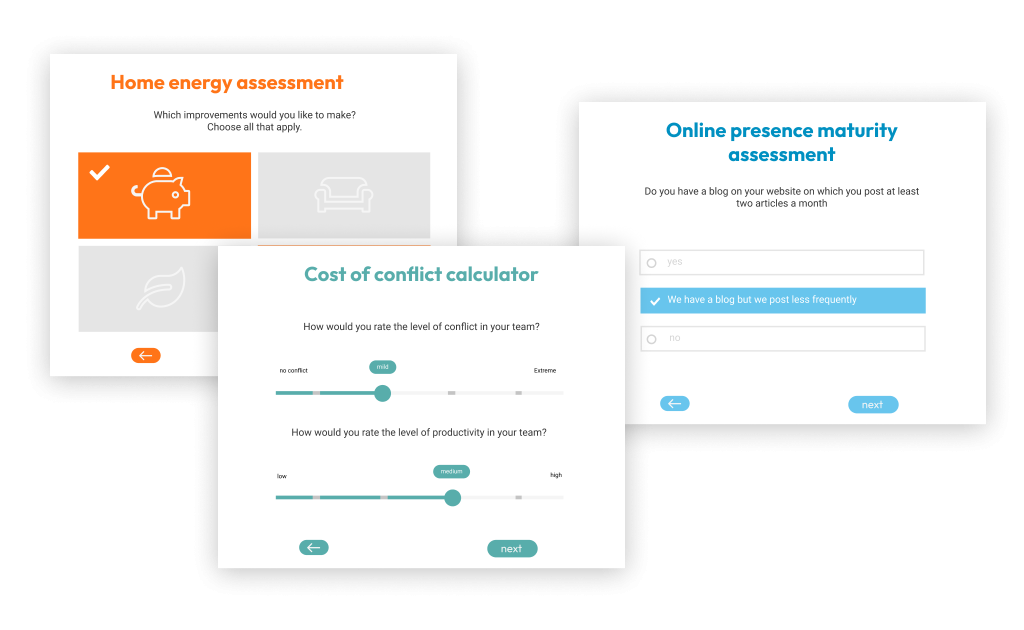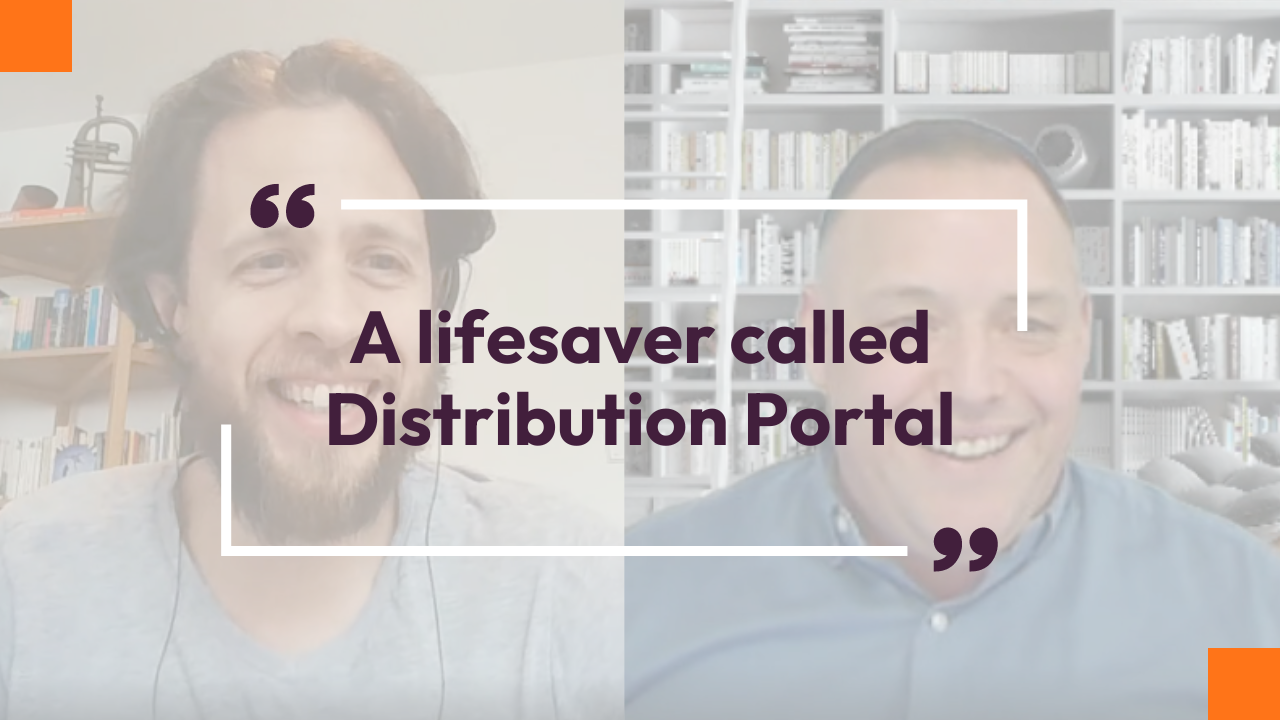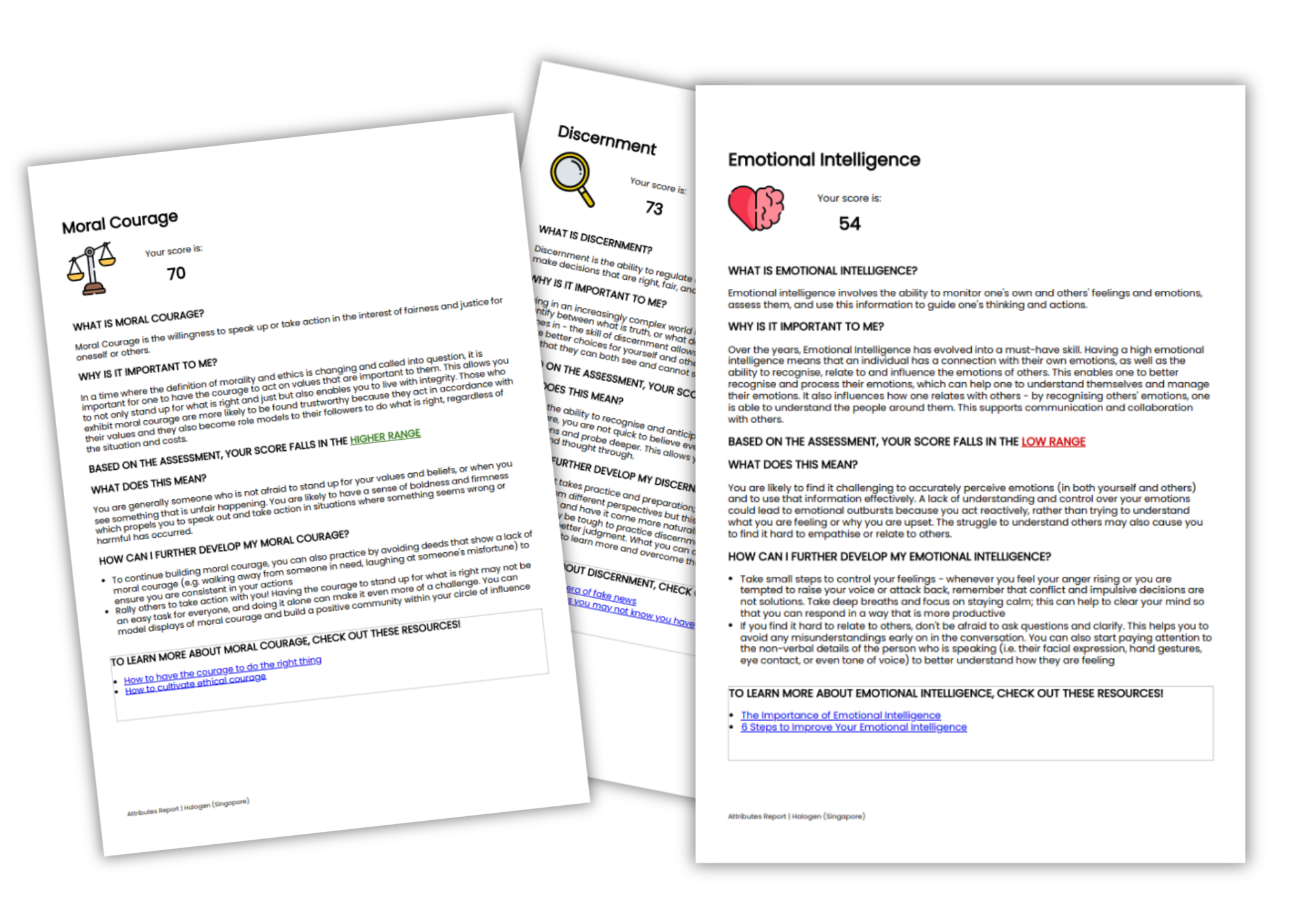Assessment template
What if you could build engaging assessments that auto-generate personalized feedback to every respondent?
Based on a no-code, score-based assessment, you literally digitize and automate your advice service.
Pointerpro is the 2-in-1 software that combines assessment building with personalized PDF report generation.

What is an assessment (template)?
An assessment is a questionnaire that evaluates individual’s or a group’s performance, skills, knowledge, or other abilities. When you’re using assessment software, your assessment template gathers, analyzes, and interprets data from respondents.
You can use and customize assessment templates in various domains. That includes education, professional development, recruitment, and employee training. Customized assessments are built more and more by consultants and professional service providers.
Some assessment tools, like Pointerpro, offer report building features. These automatically translate respondent input into personalized feedback, in the form of a PDF report. An assessment like this is also referred to as a “prescriptive assessment” (as opposed to a merely “descriptive” assessment).
3 reasons to use Pointerpro as an assessment tool
3 reasons to use Pointerpro as an assessment tool
Interactive user experience
With the Questionnaire Builder, you get to create an engaging assessment. How? With numerous design and layout options, useful widgets and countless question types.
Refined, score-based analysis
Our custom scoring engine helps you quantify and categorize diverse answers. The result? An objective and nuanced assessment of your respondents’ answers.
Automated feedback in PDF
Thanks to your setup in the Report Builder, respondents instantly get a detailed PDF report: with helpful charts, a personalized analysis, and actionable tips.
1.500+ businesses worldwide build assessments with Pointerpro









Prescriptive assessment vs descriptive assessment
Prescriptive assessment and descriptive assessment are two different approaches to evaluating and dealing with a respondents situation. The approaches serve different purposes and focus on different aspects of assessment.
Descriptive assessment:
- Purpose: Descriptive assessments aim to provide a comprehensive and detailed understanding of an individual or organization. It focuses on describing the current state of affairs, without necessarily prescribing specific actions for improvement.
- Methodology: Descriptive assessments involve collecting and analyzing data to create a detailed profile of an individual’s strengths, weaknesses, skills, and knowledge. This information is often presented in a descriptive manner, without explicit recommendations for improvement.
- Most common usage: Academic or research settings that strongly focus on analyzing a current situation in a highly detailed manner.
Prescriptive assessment:
- Purpose: Prescriptive assessment is geared towards providing specific recommendations or interventions to improve performance. It goes beyond describing the current state and offers guidance on how to enhance skills or address identified weaknesses.
- Methodology: Prescriptive assessments involve not only evaluating current performance but also suggesting specific actions, strategies, or interventions that can lead to improvement. The goal is to provide a roadmap for development.
- Most common usage: Consulting or professional service settings where service providers scale their advice delivery to customers. Also in the context of online surveys, prescriptive assessment templates are increasingly popular because they help attain better response rates. Feedback reports create extra incentive for respondent to complete questionnaires.
How to make an assessment (template)?
Crafting a digital assessment template involves a strategic process tailored to the online environment. Always begin by clearly defining the purpose and objectives of the assessment.
Pinpointing what it is exactly you want to measure. Your assessment design should prioritize user-friendliness. That means creating an assessment that is visually appealing and intuitive for respondents. Also don’t forget about using your own branding.
But before you start to build: Account Executive Stacy urges you to focus on three things – based on her experience with Pointerpro clients,
- Work out your questions, possible answer choices and scoring mechanism.
- Have a distribution strategy ready for your assessment, once it’s made.
- Define what feedback you want to return to respondents.
One list tip, before you start to distribute the assessment to numerous respondents: Conduct a small-scale test to identify any glitches. Better safe than sorry, right? Also, once your assessment is live, regularly review and update it based on feedback and evolving goals.
50 assessment example questions
Here are 50 assessment example questions divided into 5 categories:
- 10 maturity assessment template questions
- 10 biopsychosocial assessment example questions
- 10 risk assessment example questions
- 10 needs assessment example questions
- 10 threat assessment example questions
10 maturity assessment example questions about company leadership
- How would you describe the level of self-awareness demonstrated by leaders within your organization?
- To what extent do leaders in your organization foster a culture of open communication and transparency?
- How well do leaders in your organization adapt to change and demonstrate resilience in the face of challenges?
- To what extent are leaders in your organization committed to fostering the professional growth and development of their teams?
- How effectively do leaders in your organization empower and delegate responsibilities to their team members?
- To what extent do leaders in your organization demonstrate empathy and consideration for the well-being of their team members?
- How would you characterize the level of innovation and strategic thinking exhibited by leaders within your organization?
- To what extent do leaders in your organization prioritize and promote diversity, equity, and inclusion?
- How well do leaders in your organization inspire and motivate their teams to achieve common goals?
- What measures are in place to ensure ethical leadership and integrity within your organization?
These leadership maturity assessment template questions evaluate various dimensions of leadership within an organization. The questions cover aspects such as self-awareness, communication, adaptability, commitment to development, empowerment, empathy, innovation, diversity and inclusion, inspiration, and ethical leadership.
Respondents can select the option that best reflects the current state of leadership within their organization. The assessment provides insights into leadership strengths and areas for improvement, guiding organizations in developing effective leadership practices.
10 biopsychosocial assessment example questions
A biopsychosocial assessment is a holistic approach to understanding an individual’s well-being by considering biological, psychological, and social factors. Here are 10 questions that cover a good range of aspects for an assessment template:
- How would you describe your current physical health and any medical conditions you may have?
- Can you share your thoughts and feelings about your current life situation and any stressors you are experiencing?
- Describe your current living situation, including your relationships with family and friends.
- Are you currently taking any medications or undergoing any medical treatments?
- Have you ever been diagnosed with a mental health condition, and if so, what type of treatment or therapy have you received?
- How do you typically spend your time during the day, including work, school, or other activities?
- Are there any genetic or hereditary conditions in your family that you are aware of?
- How would you rate your overall energy levels, sleep patterns, and appetite?
- Can you describe your social support network? Who can you turn to for help or companionship?
- How do you see the interplay between your biological, psychological, and social aspects in shaping your overall well-being?
What Pointerpro clients are saying




5 tips on how to customize your assessment forms
Customizing assessment questionnaire forms is crucial to ensure they meet the specific needs and objectives of your assessment. But of course, your assessment is especially about your respondents and motivating them to complete it.
Here are some tips for effectively customizing your assessment questionnaire forms:
- Understand your audience: Consider the characteristics and preferences of your target audience. Ensure that the language, tone, and content are appropriate and accessible to those completing the assessment.
- Select relevant questions: Tailor the questions to address the specific aspects you want to assess. Choose questions that align with your objectives and avoid unnecessary or redundant inquiries.
- Prioritize key areas: Identify the most critical areas or factors you want to evaluate. Prioritize questions related to these key areas to ensure you gather essential information.
- Consider cultural sensitivity: Be mindful of cultural diversity and sensitivity. Ensure that questions are culturally appropriate and avoid any language or assumptions that may be offensive or alienating.
- Use a mix of question types: Incorporate a variety of question types, including multiple-choice, open-ended, and scaled questions. This adds depth to your assessment and accommodates different response styles.
- Allow for customization by respondents: Consider providing space for respondents to provide additional comments or insights beyond the predefined questions. This can yield valuable qualitative data.
- Ensure clarity and simplicity: Use clear and straightforward language in your questions. Avoid jargon or complex wording that might confuse respondents. Make sure the questions are easy to understand.
- Incorporate graphic design and branding: Use colors and visual design to make your assessment look professional. Ideally, you’re able to fully brand your questionnaire with your logo and brand colors.

How to make a customized assessment PDF report
Creating a customized assessment PDF report involves thoughtful consideration of content, design, and audience needs. The goal is to present information in a meaningful and visually appealing way that effectively communicates key findings and insights. Here are a few key tips:
- Customize visual elements: Incorporate charts, graphs, and other visual elements to enhance the presentation of data. Choose visuals that effectively convey information and support key findings.
- Use clear and concise language: Write in a clear and concise manner. Avoid jargon and complex language that may confuse readers. Ensure that the report is easy to understand for a diverse audience.
- Provide context and interpretation: Offer context for the findings and interpretations. Help readers understand the significance of the data and how it relates to the broader assessment goals.
- Include concrete recommendations: When applicable, provide actionable recommendations based on the assessment results. Help readers understand how they can use the information to make informed decisions or improvements.
- Interactive elements: If applicable, consider adding interactive elements to the PDF, such as hyperlinks to sources with further reading, to enhance the user experience and facilitate navigation.
- Foresee interaction: Seek feedback from stakeholders or a test group before finalizing the report. Communicate in your report how they can easility provide you with input or feedback.
- Brand consistency: Maintain brand consistency in the report's design, using colors, fonts, and logos that align with your organization's brand guidelines. This enhances professionalism and recognition.
7 more commonly used assessment templates
- Risk assessment template: A Risk assessment is a structured tool used by organizations to identify, evaluate, and prioritize potential risks that could affect projects, processes, or the entire organization. It involves assessing the likelihood and impact of various risks and is typically distributed and managed by risk management teams or project managers.
- Self-assessment template: A self-assessment is a tool that individuals use to reflect on and evaluate their own performance, skills, and personal attributes. These templates are often distributed as part of personal development programs within organizations, facilitated by HR departments, managers, or individuals themselves.
- Competency assessment template: A competency assessment is designed to evaluate an individual's skills, knowledge, and abilities in specific competencies relevant to their role. These assessments are commonly administered by HR departments, managers, or training and development teams as part of performance evaluations or professional development initiatives.
- Needs assessment template: A needs assessment is a tool used by organizations to identify performance gaps and determine the necessary resources and interventions for improvement. These templates are typically distributed and managed by HR departments, organizational development teams, or consultants to guide strategic planning and decision-making.
- 360° assessment template: A 360° assessment gathers feedback from multiple sources, including peers, supervisors, subordinates, and self-assessment. These assessments are often initiated by HR departments or leadership development teams to provide a comprehensive view of an individual's performance. They may be part of leadership development programs and are distributed with the support of HR or training professionals.
- DISC assessment template: A DISC assessment is based on the DISC model, assessing personality traits and behaviors, categorizing individuals into four main types: Dominance, Influence, Steadiness, and Conscientiousness. These assessments are often distributed and interpreted by HR departments, management teams, or external consultants for team building, communication training, and personal development.
- Impact assessment template: An impact assessment is used to evaluate the potential effects of a project, policy, or program on various factors, including social, economic, and environmental aspects. These assessments are commonly distributed and managed by project managers, environmental consultants, or government agencies to inform decision-making processes and ensure responsible planning.
Why an online assessment is the perfect tool for a modern consultant
In the landscape of consultancy, the need for a shift towards online consulting strategies is becoming more pronounced, driven by the need for flexibility, efficiency, and accessibility. Online assessments emerge as a perfect tool for consultants aiming to operate more online. It allows them to take in informations from customers more efficiently. It even gets them to automate their advice delivery and therefore scale their operations without increasing their payroll.
Flexibility and accessibility
One of the key reasons online assessments are ideal for consultants is the flexibility they provide. Consultants often work with customers located in different time zones, and online assessments allow for asynchronous interactions. This flexibility is particularly valuable for consultants who want to accommodate diverse schedules and global clientele seamlessly.
Online assessments break down geographical barriers, enabling consultants to engage with customers regardless of their physical location. This accessibility fosters a more inclusive approach to consultancy, reaching a broader audience and expanding the consultant’s reach.
Efficient data collection and analysis
Online assessments streamline the process of data collection and analysis, providing consultants with efficient tools to gather and interpret information.
Traditional assessment methods can be time-consuming, involving manual data entry and analysis. Online assessments automate these processes, allowing consultants to focus more on interpreting results and deriving valuable insights. The speed and efficiency of online assessments enable consultants to provide timely and data-driven recommendations to their customers, enhancing the overall consulting experience.
Tailored and customizable solutions
Consultants often require tailored solutions to meet the unique needs of their customers. Online assessments offer a level of customization that is challenging to achieve with traditional methods. Consultants can design assessments that precisely align with their customers’ objectives, ensuring that the data collected is highly relevant.
This customization enhances the value of the consulting service, as consultants can address specific challenges and deliver targeted recommendations based on the assessment outcomes.
Enhanced collaboration and communication
The online nature of assessments facilitates enhanced collaboration and communication between consultants and their clients.
Consultants can easily share assessment links, reports, and updates in real-time. Online platforms often include communication features, enabling consultants and clients to discuss assessment results, clarify queries, and strategize collectively. This increased collaboration strengthens the consultant-client relationship, fostering a sense of partnership and shared accountability for outcomes.
Scalability and consistency
For consultants looking to scale their operations, online assessments offer the perfect solution. Whether working with a small team or a large enterprise, online assessments can accommodate varying scales of operations without compromising on quality.
The consistency provided by online assessments ensures that each client receives a standardized and reliable evaluation process, maintaining the integrity of the consultancy service. This scalability and consistency contribute to the consultant’s ability to manage multiple clients efficiently and effectively.
Data security and privacy
Concerns about data security and privacy are paramount in the consultancy profession. Online assessment platforms often prioritize robust security measures, safeguarding sensitive client information. By utilizing reputable online assessment tools, consultants can assure their clients that their data is handled securely and in compliance with data protection regulations. This commitment to data security builds trust and reinforces the consultant’s professionalism.
Real-time feedback and iterative improvement
Online assessments provide consultants with the advantage of real-time feedback. Consultants can monitor participant progress, identify trends, and adapt their approach as needed. This real-time insight allows for iterative improvement, enabling consultants to fine-tune their methodologies and assessments based on immediate feedback.
The ability to adapt and refine the assessment process in real time contributes to the consultant’s agility and responsiveness to client needs.
Create your own assessment today
You may also be interested in
Recommended reading

Vlerick Business School digitalizes entrepreneurship development with Pointerpro [case study]
What do a top-tier international business school based in the capital of Europe and Pointerpro have in common? At the

Attain Global: How to do psychometric tests right and build a cutting-edge international business [case study]
In many countries worldwide, the pursuit of skillful and engaged employees is not so much a war on talent as

How youth development specialist Halogen reaches thousands of young Singaporeans with Pointerpro [case study]
Singapore, in Southeast Asia, is a global, economic powerhouse with a population of a little less than 6 million people.


